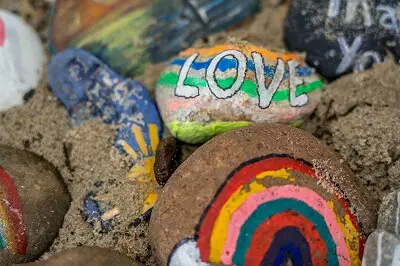The words “Much Love” are common in conversations. Whether it is in physical conversations or in non-physical conversations like text messages and email, many people like using them. It can be a bit confusing to hear the words “Much love” used by someone when addressing you in whatever way.

For example, if you’re talking to a stranger and they say “Much love” you’ll probably not know how to respond. Knowing how to reply to these words is important as it will help you to avoid being in an awkward situation or answering in the wrong way.
To “Much love,” you reply to people close to you with a “Much love to you! I enjoy every second with you.” In all other cases, mirror the statement and merely reply: “Much love to you too. Thanks for everything.”
Consider the Context in Which It Was Said
The words “Much love” may seem like innocent words, but if you take a closer look at the context in which they are used, they may have a deeper meaning. A 2016 article by ResearchGate affirms that when it comes to communication, you have to look at the context or situation in which certain words or statements are used. [1]
For the words “Much love”, context carries a great deal of significance. Who is the person saying the statement? How did the words come out? These are important questions you should ask yourself when replying to the statement.
We can look at the meaning of “Much love” from two angels.
- The first meaning of the phrase is when one is showing respect or appreciation to their friends or family members. It is a way of demonstrating your commitment to people you value in your life.
- The second meaning when using the phrase can be when you’re showing someone your affection towards them, but you don’t want to use the phrase “I love you”.
In other words, you don’t want to be too intense in expressing your feelings while, at the same time, you don’t want to appear disinterested in someone. It is a phrase that’s commonly used when saying goodbye to someone.
When Used in a Situation of Showing Appreciation to Friends and Family
If you’re conversing with your friends over lunch and one of them happens to tell you “Much love” this means that you are important to them as a friend. It means that your friendship means a lot to them and that’s why they are appreciating you.
In such a situation, your reply should be on the same wavelength. You should respond in a way that accepts the appreciation and cement the friendship you share.
You can say something like:
“Much love to you bro. I appreciate your continued support of my plans. I can always count on you.”
In this case, depending on what you were conversing about, make sure that your reply acknowledges the good gesture by the speaker. Remember, this can be in the middle of a conversation. It doesn’t have to be at the end of it.
Also, you could be having a conversation with a family member or a friend and then at the end they say “Much love”. The key part of this scenario is that the phrase comes at the end of the conversation.
This means that it may not be related to the things you were talking about since the conversation started. This is just a way of showing you that they appreciate your time and contribution to the meeting you’ve had together.
In this case, you can reply with something like:
“Much love to you too. Am grateful that we had a chance to spend some time together. Hope to see you soon.”
As you can see, the reply is not tied to anything in particular. Rather, you’re just thanking them for the chance of spending time together with you.
When Used in a Situation of Showing Affection
This is a tricky one because it may leave room for interpretation. When a person uses this phrase and your relationship is not well defined, you may wonder what they are thinking about. You may even fail to know how to respond to it.
For example, if a person of the opposite sex you’ve just met a few days ago sends you a text message or email saying “Much love dear”, you’ll probably wonder what to say back to the person.
As you have known, there are people who use the phrase as a grey area. They don’t want to say “I love you” but they also don’t want to look completely disinterested, so they choose to say “Much love”. This, already, shows that there is something that’s not clear.
If you’re in an unclear situation and someone sends you a “Much love” message, the best way to respond to it is to say “Much love to you too”. Since you may not be aware of the level of affection between the two of you, it’s prudent to be safe.
If you answer in an intense way, you may create room for a conversation you’re not ready for. So, it’s better to remain safe than to open up yourself to a stranger or someone you haven’t known well.
However, if it’s someone you know well and you’re comfortable conversing with, you can respond in a way that can spark more talk. For example, you can say something like:
“Much love to you too. Thanks for everything. We should meet up again soon.”
As you can see here, the conversation is different from the earlier one. In this case, you’re replying to someone you already know and understand. You don’t have a problem with creating room for more talk.
Certainly, “Much love” is a casual phrase that you’ll likely hear a lot in your conversations. It is rarely used in formal conversations. When responding to it in a conversation, it is important to be positive because it comes in a positive way.
Even if you’re responding to someone you don’t know quite well, it’s prudent to be positive and set the right tone for the conversation. At the end of the day, this is a casual phrase that you can reply to in different ways depending on the context of the conversation.
References:
[1]: https://www.researchgate.net/publication/304626602_The_Importance_of_Communication...

Sophie Hammond is a journalist, psychologist, and freelance speechwriter for people in politics and business. She lives on the edge of the Rocky Mountains with her dog and a lifetime supply of books. When she’s not writing, she can be found wandering through nature or journaling at a coffee shop.

